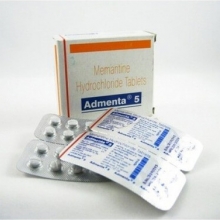Home / Categories / ADMENTA-5MG

ADMENTA-5MG
(10)
MEMANTINE HYDROCHLORIDE-5MG
DRUG USE IN TREATMENT OF ALZHEIMER'S DISEASE
SUN PHARMA LTD
Product Details
MEMANTINE HYDROCHLORIDE
Memantine is an amantadine derivative with low to moderate-affinity for NMDA receptors. It is a noncompetitive NMDA receptor antagonist that binds preferentially to NMDA receptor-operated cation channels. It blocks the effects of excessive levels of glutamate that may lead to neuronal dysfunction. It is under investigation for the treatment of Alzheimer's disease, but there has been no clinical support for the prevention or slowing of disease progression.
Indication
For the treatment of moderate to severe dementia of the Alzheimer's type.
Associated Conditions
- Mild Vascular dementia
- Moderate Alzheimer's Type Dementia
- Moderate Vascular dementia
- Moderate dementia of the Alzheimer's type
- Severe Alzheimer's Type Dementia
- Severe dementia of the Alzheimer's type
Pharmacodynamics
Memantine, an amantadine derivative, is an NMDA receptor antagonist used in the treatment of Alzheimer's disease. It differs from traditional agents used in Alzheimer's disease by acting on glutamatergic neurotransmission, rather than cholinergic. There is some evidence that dysfunction of glutamatergic neurotransmission, manifested as neuronal excitotoxicity, is involved in the aetiology of Alzheimer's disease (Cacabelos et al., 1999). As such, targeting the glutamatergic system, specifically NMDA receptors, was a novel approach to treatment in view of the limited efficacy of existing drugs targeting the cholinergic system. A systematic review of randomised controlled trials found that memantine has a positive effect on cognition, mood, behaviour, and the ability to perform daily activities. There is no evidence that memantine prevents or slows neurodegeneration in patients with Alzheimer's disease.
Mechanism of action
Memantine exerts its action through uncompetitive NMDA receptor antagonism, binding preferentially to the NMDA receptor-operated cation channels. Prolonged increased levels of glutamate in the brain of demented patients are sufficient to counter the voltage-dependent block of NMDA receptors by Mg2+ ions and allow continuous influx of Ca2+ ions into cells, ultimately resulting in neuronal degeneration. Studies suggest that memantine binds more effectively than Mg2+ ions at the NMDA receptor, and thereby effectively blocks this prolonged influx of Ca2+ ions through the NMDA channel whilst preserving the transient physiological activation of the channels by higher concentrations of synaptically released glutamate. Thus memantine protects against chronically elevated concentrations of glutamate. Memantine also has antagonistic activity at the type 3 serotonergic (5-HT3) receptor with a potency that is similar to that at the NMDA receptor, and lower antagonistic activity at the nicotinic acetylcholine receptor. This drug has no affinity for γ-aminobutyric acid (GABA), benzodiazepine, dopamine, adrenergic, histamine, or glycine receptors or for voltage-dependent calcium, sodium, or potassium channels.
Absorption
Well absorbed orally with a bioavailability of approximately 100%. Peak plasma concentrations are reached in 3-7 hours. Food has no effect on absorption.
Volume of distribution
- 9 to 11 L/kg
Protein binding
45%
Metabolism
Excreted largely unchanged. About 20% is metabolized to 1-amino-3-hydroxymethyl-5-methyl-adamantane and 3-amino-1-hydroxy-5,7-dimethyl-adamantane.
- Memantine
1-amino-3-hydroxymethyl-5-methyl-adamantane
- Memantine
3-amino-1-hydroxy-5,7-dimethyl-adamantane
Route of elimination
Memantine undergoes partial hepatic metabolism. About 48% of administered drug is excreted unchanged in urine; the remainder is converted primarily to three polar metabolites which possess minimal NMDA receptor antagonistic activity: the N-glucuronide conjugate, 6-hydroxy memantine, and 1-nitroso-deaminated memantine. It is excreted predominantly in the urine, unchanged.
Half life
60-100 hours
Clearance
Not Available
Toxicity
Side effects include pain, abnormal crying, leg pain, fever, increased apetite. Adverse drug reactions include: dizziness, confusion, headache, hallucinations, tiredness. Less common side effects include: vomiting, anxiety, hypertonia, cystitis, and increased libido. Doses of up to 400 mg have been tolerated.
SOURCE:DRUGBANK
Substitutes
Substitutes not found for ADMENTA-5MG